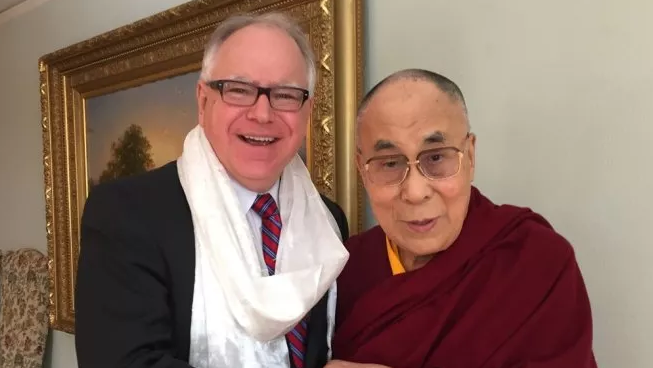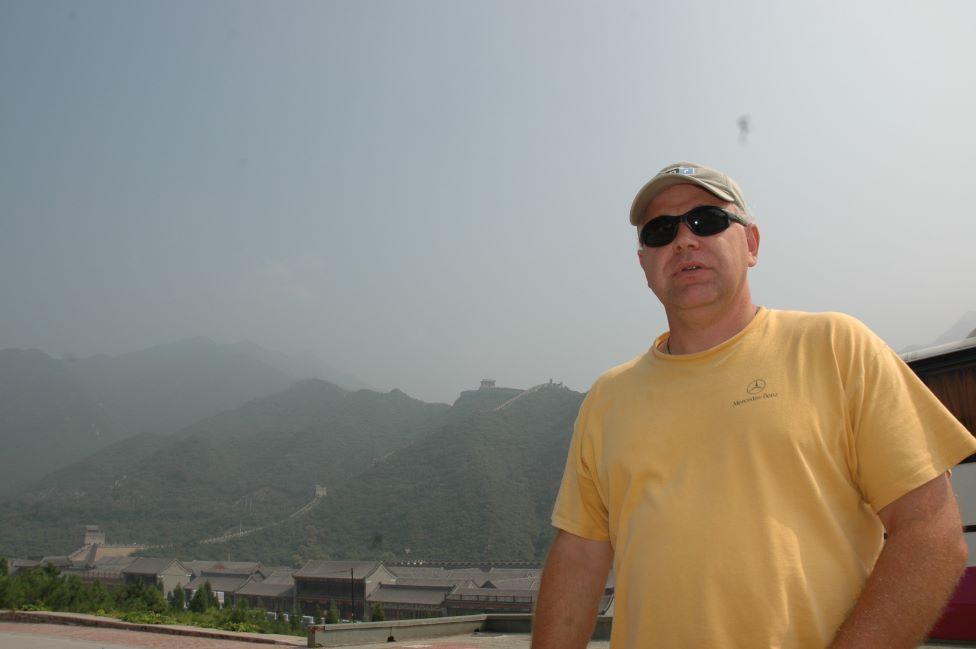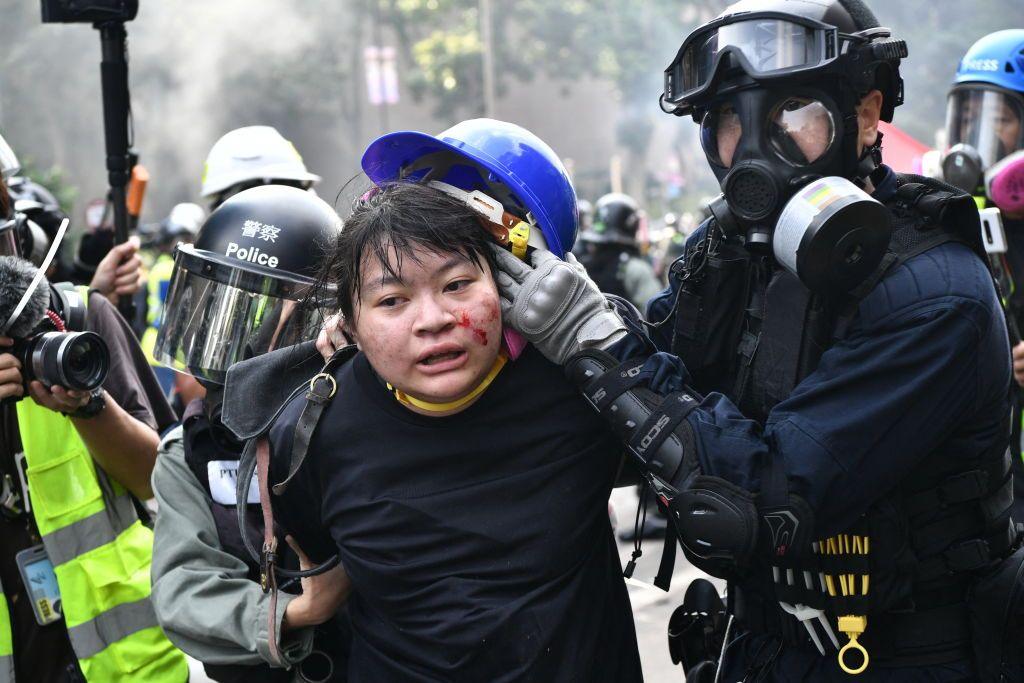Walz has history with China - it's more hawkish than critics claim

Walz meeting the Dalai Lama, a bête noire of Beijing, in 2016
- Published
Within hours of Tim Walz being declared winner of the Democratic "veepstakes", Republican accusations that he is pro-China came thick and fast.
"Communist China is very happy," Donald Trump's former ambassador to Germany, Richard Grenell, said on Twitter/X. "No one is more pro-China than Marxist Walz."
Tom Cotton, a Republican senator, said Mr Walz owed an explanation "about his unusual, 35-year relationship with Communist China".
MAGA War Room, an influential X account supporting Donald Trump, unearthed a 2016 video in which Mr Walz told the farming policy outlet Agri-Pulse that the US and China did not need to have an "adversarial relationship".
But what does the record show? Republicans may want to weaponise Mr Walz's links to China, but it's pretty slim pickings.
Walz's record
Mr Walz's personal relationship with China does indeed extend back decades.
It began in 1989 when, fresh out of college, Mr Walz began a Harvard University volunteer programme teaching American history and English at the Foshan No 1 High School in southern China.
He later set up a business with his wife Gwen organising annual summer educational trips to China. The venture lasted more than a decade and by his own estimation, Mr Walz returned to the country around 30 times.

Walz in China
But if anything, Mr Walz has been pretty hawkish towards its government, particularly on human rights.
As a congressman, he met the Dalai Lama and – before his jailing – the high-profile Hong Kong democracy activist, Joshua Wong. Both men would place at the top of the Chinese government’s list of public enemies.
In terms of his congressional record, there is not much for China to like.
He spent over a decade on the Congressional-Executive Commission on China – a body focused on scrutinising the Chinese government’s human rights abuses.
In 2016, the same year he met the Dalai Lama, he also invited the then leader of Tibet's government in exile, Lobsang Sangay, into his congressional office to meet a group of Minnesota high-schoolers.
'Harris's no 2 taught in China': Chinese internet reacts to Walz
- Published7 August 2024
Vibes and jibes - why Harris picked Walz as running mate
- Published7 August 2024
Who is Gwen Walz, wife of Harris's VP pick?
- Published20 August 2024
Trump and allies attack Walz as 'dangerously liberal'
- Published6 August 2024
Hong Kong
Mr Walz lent his strong backing to the Hong Kong Human Rights and Democracy Act, which imposed sanctions on Chinese and Hong Kong officials for human rights abuses during the city's democracy protests.
Jeffrey Ngo, a democracy activist now based in the US, has praised Mr Walz's commitment to getting the legislation passed in 2019.
"We knocked on every door when the #HKHRDA lacked momentum," he wrote on X after Mr Walz was confirmed as the Harris VP choice. "Only Walz answered his."
Mr Ngo praised Mr Walz as "the sole House Democrat willing to keep co-sponsoring the bill". Republican Chris Smith was the bill's other sponsor.

A pro-democracy protester is arrested during Hong Kong demonstrations in 2019
The Chinese reaction
Mr Walz's elevation to the Democratic ticket has prompted interest on Chinese social media.
He once described his decision to teach in China as "one of the best things I've ever done", and there were signs of hope in some of the comments that, if he wins, it may signal better US-China ties.
One Weibo user pointed out that Walz's "unique background gives him a real perspective on China", and he could "promote cultural exchanges when... relations are extremely difficult".
But others wondered whether that may be assuming too much.
The fact that his teaching posting took place in 1989 - the year of the Tiananmen Square massacre in Beijing - was not lost on some.
The Chinese cannot say much about the massacre for risk of getting censored. They refer to it obliquely - one comment simply said "if you know, you know".
Foreigners who were in China at that time "are the most anti-China", said another user.
Indeed, Mr Walz has often spoken publicly about his horror at the crushing of the Tiananmen protests, and in 2009 he co-sponsored a resolution in Congress marking its 20th anniversary.
His wife Gwen has said that the events had such an effect on Walz, that he chose 4 June - the day Beijing sent the troops in - as the date of their wedding five years later. She said that "he wanted to have a date he'll always remember".

The Tiananmen Square protests left their mark on Walz
Different eras
For more than two decades after Tiananmen, America's foreign policy was founded on a deep, bipartisan agreement that trade and engagement with China was broadly a good thing.
It is no surprise that evidence can be found of Mr Walz expressing views that align with that consensus.
On the flip side, Donald Trump's own-brand suits and ties were made in China, and he and his daughter Ivanka registered dozens of trademarks there.
Far from being pro-China, Mr Walz's record marks him out as someone who has taken a more nuanced view.
He has spoken of the need for dialogue and cooperation on issues such as trade and climate change - but remains fiercely critical when it comes to human rights.
That stance was in evidence from the very start of the relationship. When returning to Nebraska after his year in China, he told a local newspaper that there were "no limits" to what the Chinese could accomplish.
"If they had proper leadership," he added.